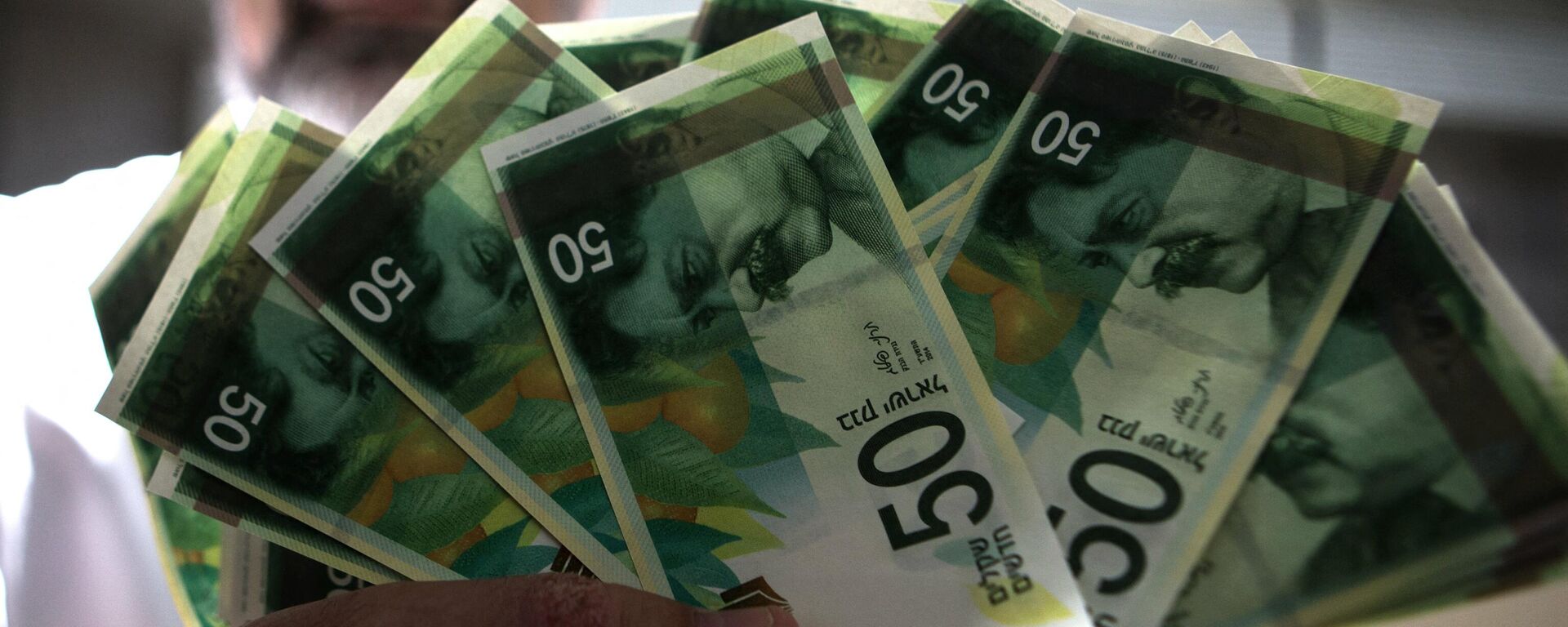https://sputnikglobe.com/20211107/illogical-and-anti-social-israeli-tweeps-angry-over-passage-of-national-budget-1090539871.html
Illogical and Anti-Social: Israeli Tweeps Angry Over Passage of National Budget
Illogical and Anti-Social: Israeli Tweeps Angry Over Passage of National Budget
Sputnik International
While Israeli politicians have patted themselves on the back for managing to avert snap elections, Twitter users have been frustrated over the rising taxes and... 07.11.2021, Sputnik International
2021-11-07T07:45+0000
2021-11-07T07:45+0000
2022-10-17T19:46+0000
middle east
israel
budget
https://cdn1.img.sputnikglobe.com/img/07e5/0b/07/1090540718_0:200:3109:1949_1920x0_80_0_0_e6067133a81fbba2e11774436a204abb.jpg
It has been two days since the Israeli Parliament, the Knesset, passed the national budget for 2021 and 2022, approving $136 bln and $142 bln for the years, respectively.This has been the first time in three and a half years that the Israeli chamber has passed a national budget, and many politicians took to social medial platforms to pat themselves on the back for managing to push through the legislation.They have also been thrilled at the prospect that they managed to avert snap elections that would have been triggered by the failure to pass the national budget.Frustration is MountingBut many Israelis have been less optimistic about the funds that have been unlocked, and just like the politicians, they too flocked to Twitter and Facebook, where they vented their anger at the policymakers."The budget of 2022 is not a good one. It has many wrong restrictions. Taxes on plastic disposables, taxes on property, taxes on entering the Gush Dan [centre of Israel - ed.]. Instead of taxing, they can find other alternatives, for example subsidies..."The past couple of years have been exceptionally difficult for Israel. Since the outbreak of the coronavirus in the country in February 2020 and the three subsequent lockdowns, hundreds of thousands of people have lost their jobs. Many others have been pushed into the poverty circle.In June, when the coalition of Prime Minister Naftali Bennett came to power, it vowed to tackle these problems. They also promised to lower the high costs of living, decrease taxes and make many basics more affordable for the masses.However, as time went by, many Israelis have realised that their words were not backed by actions. In November, Israel lifted taxes on plastic utensils and high-sugar drinks, a move that's believed to potentially harm the weaker layers of the population.It also raised prices on gas and basic food products, and a similar trend is also expected on mobile phone, electricity, water and municipal costs.The constantly rising prices have already prompted anger among many Israelis, and experts warn that that frustration is only going to mount, especially now as the budget was passed, and as the government has indicated its intention to go heavy on taxation.Illogical DistributionThe public is also angry for yet another reason -- what they call an "illogical distribution of funds"."53 billion NIS [$16.7 billion] will be paid as protection money to the Muslim Brothers so that they will keep the chair of [Prime Minister Naftali] Bennett and [Foreign Minister Yair] Lapid stable... overall, a logical budget," bitterly wrote one Tweep.Another added: "In the early hours of [Friday] morning, the Knesset passed the budget for 2022. It is an anti-social budget that gives 53 billion NIS to the Islamic Movement at the expense of the weaker populations and those living on the periphery. And all this is done for the political survival of Bennett and Lapid. From now on, every time you feel it in your pocket, take a look at this picture and remember who did it to you."The passing of the national budget requires at least 61 out of 120 votes in favour of the legislation. To secure that majority, PM Bennett and his coalition reportedly relied on the support of the Arab parties, including that of Mansour Abbas, which is believed to be linked to the Muslim Brotherhood movement, which is outlawed in many countries around the Middle East.However, that support was not given for free, and in the months leading up to the vote Abbas had stressed that his backing would only be guaranteed if Israel allocated billions to the Arab sector.Those generous injections were considered necessary by the Arab community, which has for years been suffering from underdevelopment, high poverty and unemployment rates, as well as widespread crime. But many tweeps were certain that the money the country has just allocated would never reach ordinary Arab citizens. They would go to the Palestinian prisoners and their supporters instead.That frustration with decision-makers and their policies is already showing in ratings. A recent poll, conducted by Israel's channel 13, revealed that had the elections been held today, Bennett's Yamina party would have received only 6 out of 120 seats at the Knesset.On the other hand, the head of the opposition, former PM Benjamin Netanyahu, is only getting stronger, receiving 36 seats at the chamber, six spots more than what he had gotten in the last round of general polls.Now as the budget has passed, the future of the current coalition seems stable, and that means that the Israeli public will need to learn to live with the budget, its taxes and its restrictions.
https://sputnikglobe.com/20211105/israel-passes-national-budget-but-wheres-the-money-headed-1090490028.html
israel
Sputnik International
feedback@sputniknews.com
+74956456601
MIA „Rosiya Segodnya“
2021
News
en_EN
Sputnik International
feedback@sputniknews.com
+74956456601
MIA „Rosiya Segodnya“
Sputnik International
feedback@sputniknews.com
+74956456601
MIA „Rosiya Segodnya“
middle east, israel, budget
middle east, israel, budget
Illogical and Anti-Social: Israeli Tweeps Angry Over Passage of National Budget
07:45 GMT 07.11.2021 (Updated: 19:46 GMT 17.10.2022) While Israeli politicians have patted themselves on the back for managing to avert snap elections, Twitter users have been frustrated over the rising taxes and the fact that significant funds have been allocated to the Arab sector.
It has been two days since the Israeli Parliament, the Knesset, passed the national budget for 2021 and 2022, approving $136 bln and $142 bln for the years, respectively.
This has been the first time in three and a half years that the Israeli chamber has passed a national budget, and many politicians took to social medial platforms to pat themselves on the back for managing
to push through the legislation.
They have also been thrilled at the prospect that they managed to avert snap elections that would have been triggered by the failure to pass the national budget.

5 November 2021, 06:05 GMT
But many Israelis have been less optimistic about the funds that have been unlocked, and just like the politicians, they too flocked to Twitter and Facebook, where they vented their anger at the policymakers.
"The budget of 2022 is not a good one. It has many wrong restrictions. Taxes on plastic disposables, taxes on property, taxes on entering the Gush Dan [centre of Israel - ed.]. Instead of taxing, they can find other alternatives, for example subsidies..."
The past couple of years have been exceptionally difficult for Israel. Since the outbreak of the coronavirus in the country in February 2020 and the three subsequent lockdowns, hundreds of thousands of people have lost their jobs. Many others have been pushed into the poverty circle.
In June, when the coalition of Prime Minister Naftali Bennett came to power, it vowed to tackle these problems. They also promised to lower the high costs of living, decrease taxes and make many basics more affordable for the masses.
However, as time went by, many Israelis have realised that their words were not backed by actions. In November, Israel lifted taxes on plastic utensils and high-sugar drinks, a move that's
believed to potentially harm the weaker layers of the population.
It also raised prices on gas and basic food products, and a similar trend is also
expected on mobile phone, electricity, water and municipal costs.
The constantly rising prices have already prompted anger among many Israelis, and experts warn that that frustration is only going to mount, especially now as the budget was passed, and as the government has indicated its intention to go heavy on taxation.
The public is also angry for yet another reason -- what they call an "illogical distribution of funds".
"Our budget for 2021: the Ministry of Education will get 65 billion NIS [$21 billion], the Ministry of Defence 58 billion NIS [$18 billion], the Ministry of Health 43 billion NIS [$13 billion], and the transportation 37.1 billion NIS [$11.7 billion]".
"53 billion NIS [$16.7 billion] will be paid as protection money to the Muslim Brothers so that they will keep the chair of [Prime Minister Naftali] Bennett and [Foreign Minister Yair] Lapid stable... overall, a logical budget," bitterly wrote one Tweep.
Another added: "In the early hours of [Friday] morning, the Knesset passed the budget for 2022. It is an anti-social budget that gives 53 billion NIS to the Islamic Movement at the expense of the weaker populations and those living on the periphery. And all this is done for the political survival of Bennett and Lapid. From now on, every time you feel it in your pocket, take a look at this picture and remember who did it to you."
The passing of the national budget requires at least 61 out of 120 votes in favour of the legislation. To secure that majority, PM Bennett and his coalition reportedly relied on the support of the Arab parties, including that of Mansour Abbas, which is believed to be linked to the Muslim Brotherhood movement, which is outlawed in many countries around the Middle East.
However, that support was not given for free, and in the months leading up to the vote Abbas had stressed that his backing would only be guaranteed if Israel allocated billions to the Arab sector.
Those generous injections were considered necessary by the Arab community, which has for years been suffering from underdevelopment, high poverty and unemployment rates, as well as widespread crime. But many tweeps were certain that the money the country has just allocated would never reach ordinary Arab citizens. They would go to the Palestinian prisoners and their supporters instead.
That frustration with decision-makers and their policies is already showing in ratings. A recent
poll, conducted by Israel's channel 13, revealed that had the elections been held today, Bennett's Yamina party would have received only 6 out of 120 seats at the Knesset.
On the other hand, the head of the opposition, former PM Benjamin Netanyahu, is only getting stronger, receiving 36 seats at the chamber, six spots more than what he had gotten in the last round of general polls.
Now as the budget has passed, the future of the current coalition seems stable, and that means that the Israeli public will need to learn to live with the budget, its taxes and its restrictions.




